Viva La Democrazia
Can one vote sway an Italian election? Daniela Panico believes so. Desperate to see the back of Berlusconi, when her postal ballot failed to find its way to her London mailbox she jumped on a plane and flew home to cast her vote. I went along with her and witnessed polling day in Andrano, a whitewashed fishing village on the heel of the boot.
Having registered to vote overseas, Daniela was worried they would turn her away at the polling station for fear she was trying to vote twice, so she phoned mamma, asking her to go to the municipio and find out. "As long as you promise to vote for them," her mother replied, "of course they'll let you in. Come on home for the weekend. The sun is hot and I've got some fantastic horsemeat."
With wintry showers forecast for London, Daniela's political crusade was never in doubt.

Applause as our Ryanair flight strikes the runway in Brindisi, the southernmost airport in a sun-dried stretch of Puglia called the Salento. A passenger has fainted during the flight, and the ambulance crew who storm the aircraft in operating masks look disappointed when told he has recovered.
During the 90-minute drive south, among olive groves and pasta factories, Daniela tries to tell her mother about our in-flight drama but can't get a word in. Instead, we hear the story of a darker drama: the kidnap and murder of a baby in Parma. Crimes against children boil the blood of Italians, and the nation is so outraged that I fear Berlusconi might make a last-minute proposal to introduce the death penalty if re-elected.
The best Italian mosaics are the roads in southern villages and we bump into Andrano shortly before midnight. I'm so hungry I could eat a horse, which is precisely what's on the menu. After dinner, Daniela turns the house upside down in search of her tessera elettorale: a concertina document issued to every Italian on the electoral roll. Inside are 18 square boxes to be stamped each time the person named on its cover votes in an election. In Australia such a document might outlive its bearer, but in Italy, which in the last 50 years has seen as many governments, it's something to keep handy in your wallet rather than in a drawer. Even if Daniela, 35, votes once a year she will still have the same voting card when she is in her 50s, presuming she finds it.
Sunday, the first of two polling days, is a belter: 21 degrees and delightful spring sunshine. Andrano is its usual Mediterranean-postcard self. Whitewashed houses hug the hillside, fishing boats putter from port, washing hangs from rooftops and the aroma of coffee wafts through cobblestone lanes. National elections seem a world away. What difference could a new leader in Rome make to a village that hasn't changed its morning routine in 1000 years?
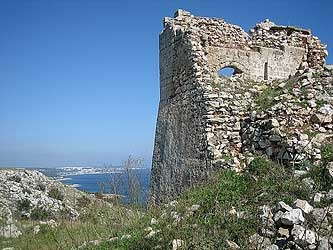
My friend Alberto calls early and invites me to play tennis; queuing in a grubby public office is the last thing he wants to do on such a gorgeous day. One of Italy's foremost social commentators, Beppe Severgnini, describes this indifference to politics as the Terrazza Law, a preference for self-gratification that has allowed Italy's leaders to break the laws they make.
"We may have had a lousy day," says Severgnini. "We may have been told that we are going to have to pay more taxes because someone in government has made off with another few billion lire. But in the evening we can have a meal al fresco with our friends, maybe on a terrazza under a clear sky, and our bitterness evaporates. This is the Terrazza Law. If we had British weather in Italy our politicians would have come to a sticky end long ago."
The world's best hedonists prefer to leave the puppet show of politics to clap itself at final curtain. Rarely do they turn out in great numbers to vote. They are too busy amusing themselves with pastimes more pleasurable than holding the nation's accountants to account. But with citizens prepared to travel home to have their say, I have my suspicions that today will be different.
A 37-year-old marketing consultant, Alberto travels over 400km to Bari each day because of an absence of jobs closer to home. Alberto is angry with Berlusconi, whom he calls the "prime-time Prime Minister" because of his stranglehold on Italy's television media. But while cretino is the most common adjective Alberto uses to describe the man in charge - for a few more hours, at least - he refuses to vote against him because he considers the left to be out of touch. As proof he cites a letter addressed to his father by the Honourable Francesco Rutelli, former mayor of Rome and leader of La Margherita - not a pizza but a political party in the left coalition. "Caro Alfredo," (Dear Alfred), the letter begins, before going on to ask for the man's support in "reopening the future of the country we love".
"Caro Rutelli," begins Alberto's reply, "my father, Alfredo, has been dead for 10 years and you didn't even bother to send a message of condolence. Now you send a letter asking for his vote. Well, until you create some jobs in the south of this country, you won't be getting it."
But history suggests the letter may not have been an oversight, for, in Sicily especially, the votes of deceased persons have often been counted.
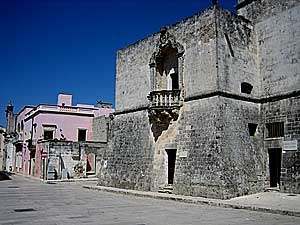
When I return to the house in the early afternoon, Daniela is still searching for her tessera and firing off blasphemies that her mother finds objectionable so close to Easter. "You won't be the only one who's lost it," she shouts from the kitchen. "Just ask for a duplicato at the town hall." Daniela agrees and we head off to vote, striding pot-holed streets on our way to the piazza. In the shortening shadows of a medieval castle, we bump into the town postman, himself on his way to the polling station.
"Ciao!" he yells when he spots us. "I'm a wanker! Are you?"
"Assolutamente," Daniela replies. "Everyone in Italy is, I hope."
Their exchange has been fuelled by Berlusconi, who, in his electoral campaign, said that "only a wanker would vote for the left because they would be voting against their own interests." But, like the ancient Fiat 500s chugging across Andrano's piazza, the insult backfired. Never have I seen so many people proudly calling themselves names. All over the country they are turning out to vote in T-shirts bearing the transfer "Mr Berlusconi, io sono un coglione" (Mr Berlusconi, I am a wanker).
A crowd has gathered outside the primary school - Andrano's polling station. The road is closed and two vigili have whistles in their mouths ready to red card offenders. The result of the election will divide Italians, but at least polling day brings them together. One by one they file inside to cast their vote, before returning outside to wait until it's counted. They are chatting and smoking until well after 10 - wankers, friends, Italiani.
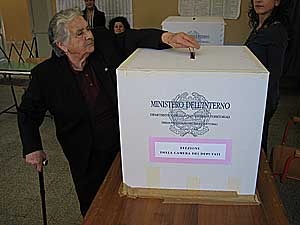
The first bad sign for Berlusconi appears when Andrano's elderly turn up to vote. They hobble inside to vent their spleen at pensions that have increased as slowly as the hair on Berlusconi's head. ("The dandruff's real but the hair's not," one satirist said). The second bad sign is a poster which a man known as Antonio l'Africano (because he spent 10 years teaching in Africa) pulls from his jacket pocket. Featuring a grinning Berlusconi with a condom on his head, the flyer warns voters: "Remember, AIDS always strikes with a smile. If you really want to be screwed by Berlusconi, at least take the right precautions." We pass the flyer around surreptitiously. Campaign material of any description is illegal on polling day.
Adjoining the primary school is the municipio where we call in for Daniela's tessera. The civil servant on duty officiated at Daniela's and my wedding in the castle and is pleased to see us back. He hands Daniela a form to fill in before printing off a new voting card that should last until she's a pensioner.
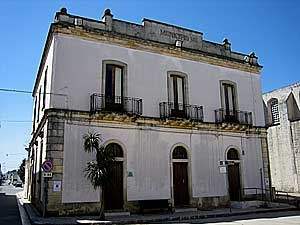
Entering the foyer of the school, we pass an armed carabiniere. It is his job to guard the ballot box, which he does while reading the newspaper at a miniature desk obviously borrowed from one of the classrooms.
After casting her vote, Daniela slides back the privacy curtain and drops her ballot paper in a cardboard box - a bit like posting a letter, which, if Royal Mail had been able to deliver, would have meant that Daniela's tessera, and my passport, both had one less stamp.








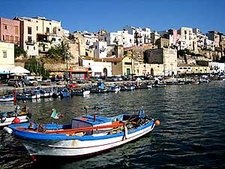 Category
Category